

Edition 61 | May 2024 THE UK’S #1 TAXI NEWS SOURCE OVER 5 MILLION MAGAZINE READS AND COUNTING... PLUS FULL ROAD ACCESS, AIPRORT FEES, FARE DODGERS, TAXI DRIVER UBER CLAIM AND UK NEWS ROUND-UP ON TAXIS AND PHVs DEBATED AUTOMATED TAXI: THE KEY DISCUSSIONS IMAGE CREDIT: DALL.E (AI GENERATED) VAT IMPACT PLUS GLASGOW DEADLINE DRAWS NEAR BATTLE BETWEEN STREET AND APP WORK KEY
FOR BANK JCT
MONTH AHEAD


TaxiPoint Chief Editor:
Perry Richardson
TaxiPoint Publishing & Advertising Manager:
Lindsey Richardson
Visit us online at:
www.taxi-point.co.uk
Write to us at: contact@taxi-point.co.uk
Advertising enquiries at: advertising@taxi-point.co.uk
The publishers reserve the right to refuse, withdraw, amend or otherwise deal with all advertisements without explanation. All advertisers must comply with the British Code of Advertising practice.
The views expressed in this publication are not necessarily those of the publishers.
All written and image rights are reserved by the author as displayed.
Reproduction in whole or in part without prior permission from the publisher is strictly prohibited.
Copyright brand TaxiPoint 2024. Creative Common image licences displayed where applicable.

FROM THE EDITOR
PERRY RICHARDSON
MILESTONES AND DEVELOPMENTS
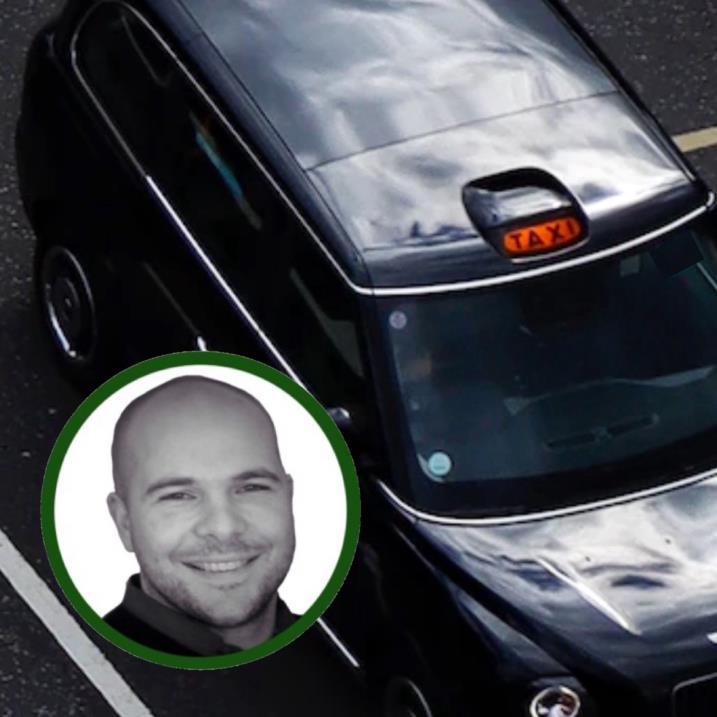

Hello and welcome to our latest edition of TaxiPoint Magazine for May 2024.
We've been hard at work to bring you the latest on key industry topics, from the private hire VAT consultation to the group claim for loss of earnings made by London taxi drivers against Uber.
This month, TaxiPoint marked a notable milestone on TikTok, reaching over a million views within just six weeks of launching our video content channel. Our expanded reach continues to engage more of the UK’s taxi industry audience. As always, we remain committed to delivering
trusted taxi news through preferred channels.
As we go to press, we are gaining insight into the future mayoral landscape in cities like Birmingham, Manchester, and London. The question now is how taxi and road surface transport policy will evolve.
We hope you enjoy this edition and encourage you to share it with industry colleagues.
Be lucky,
 TaxiPoint Editor
TaxiPoint Editor
and
Founder
2 | TAXIPOINT | MAY 2024 | EDITION 61 WWW.TAXI-POINT.CO.UK



PRESSURE MOUNTS FOR GLASGOW TAXI OPERATORS OVER EMISSION STANDARDS DEADLINE
Glasgow's efforts to combat air quality through its Low Emission Zone (LEZ) regulations have long left cabbies facing significant hurdles. With just weeks remaining, over 300 taxis remain non-compliant with the necessary standards.
The LEZ, which restricts older petrol and diesel taxis from entering the city centre, was established on 1 June 2023. Since then, the city has been working to ensure that its fleet of black cabs meets new, stricter emission guidelines.
Initially, the implementation of the LEZ led many taxi operators to apply for a 12-month exemption, extending their compliance deadline to 31 May 2024. This move was aimed at providing operators additional time to either purchase new compliant vehicles or retrofit their existing ones to meet the LEZ standards. At the time of the exemption application, more than 600 of the 1,383 registered black cabs in Glasgow were granted a reprieve from the immediate enforcement of the rules.

4 | TAXIPOINT | MAY 2024 | EDITION 61 WWW.TAXI-POINT.CO.UK
IMAGE CREDIT: DALL.E (AI GENERATED)


As the final weeks tick down to the 1 June 2024 deadline, the situation remains precarious. Recent updates from a city administration committee meeting reveal that despite a push for modernisation and additional retrofit funding, over 300 hackney carriage taxis are still falling short of compliance. Of those taxis still non-compliant, 76 have been given exemptions.
The reopening of the ‘LEZ Retrofit Fund’, managed by the Energy Saving Trust, will likely help some drivers. This fund is intended to provide financial assistance for necessary vehicle modifications. However, based on the performance of similar initiatives in the past, there are concerns about whether the fund will be adequate to cover all remaining noncompliant taxis.
The implications of these compliance challenges are wide-reaching. A potential shortage of taxis
compliant with the LEZ could emerge, affecting the availability of transport options within the city centre. Moreover, for those taxi owners who manage to meet the LEZ requirements, there might be a slight increase in demand due to reduced competition. However, this scenario does not bode well for the health of the taxi industry overall. A shrinking fleet could hinder service coverage and operational stability.
As the deadline approaches, the city council and taxi operators alike face pressing questions about the future of Glasgow's taxi industry. Will the combined efforts of exemptions and retrofit funding suffice to bring the remaining noncompliant fleet up to standard? Or will the city see a decline in its taxi services, impacting both drivers and passengers? The coming weeks are crucial for determining how Glasgow navigates this environmental and logistical challenge.

5 | TAXIPOINT | MAY 2024 | EDITION 61 WWW.TAXI-POINT.CO.UK
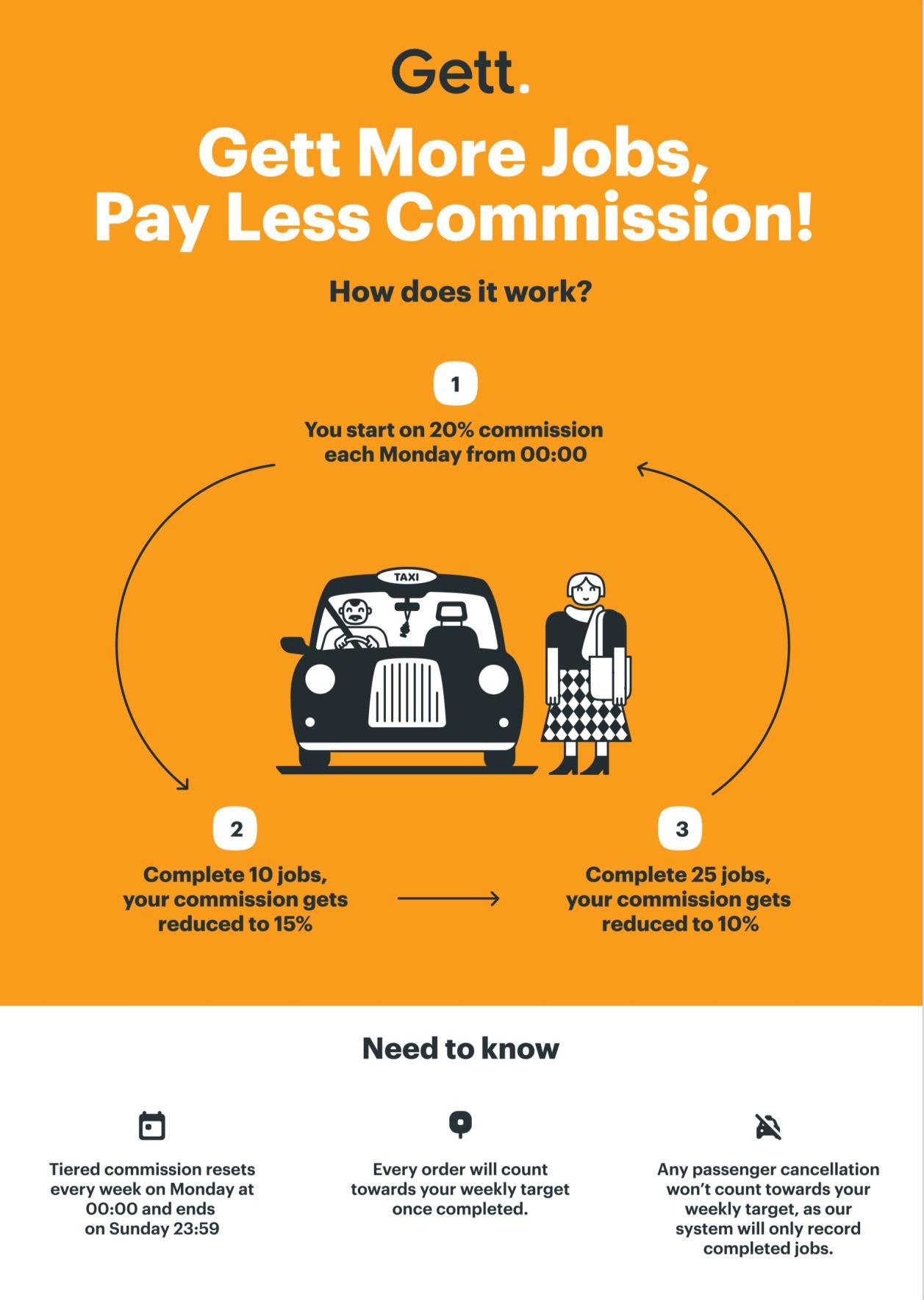

AUTOMATED VEHICLES:
THE KEY TAXI INDUSTRY DISCUSSIONS NEEDED NOW
The Automated Vehicle Bill is building momentum, signalling a new era for UK road transport, but crucially also for the taxi industry. The legislative proposal is aimed at addressing the challenges and opportunities brought about by the introduction of automated cars, but are the relevant discussions being had about the impact it will have on an industry with over 300,000 drivers?
Any agreed Bill must recognise the potential job displacement that could result from a decrease in the demand
for human-driven taxis. Will discussions begin that would explore avenues for those within the industry to transition towards roles that accommodate new technology?
The Bill has begun calling for comprehensive regulatory changes. Current regulations governing taxi and private hire vehicle (PHV) services will require revisions to incorporate the safety, licensing, and operational standards for automated vehicles. But again, how will this impact the industry and what level of input will the trade have?

7 | TAXIPOINT | MAY 2024 | EDITION 61 WWW.TAXI-POINT.CO.UK

Quite simply, 300,000 taxi and PHV drivers will not be required. If they all stayed it would saturate a market with a now unlimited workforce of AI driven cars to meet the required demand. Some drivers will have to face up to the need to acquire new skills as the industry evolves. What skills can be adapted, ensuring that workers are equipped to manage or work alongside new technologies?
The economic implications of this shift to automated vehicle (AV) has always involved the potential around job creation in a new technological sector. But little focus has been placed on assessing the broader impact on the taxi industry and its related
Little focus has been placed on assessing the broader impact on the taxi industry and its related employment sectors…
employment sectors, acknowledging that changes could have far-reaching effects on the UK economy. The acceptance of AV taxis by the public will significantly influence the speed of decline for traditional taxi services. At what stage do local authorities stop taking in new taxi driver applications and is the current lack of applicants down to the future threat of AVs?
Automated vehicles are on their way. The timescales remain unknown, but the technology is now live in cities around the world. This is no longer a futuristic fantasy. This will arrive for many during their working lifetime.
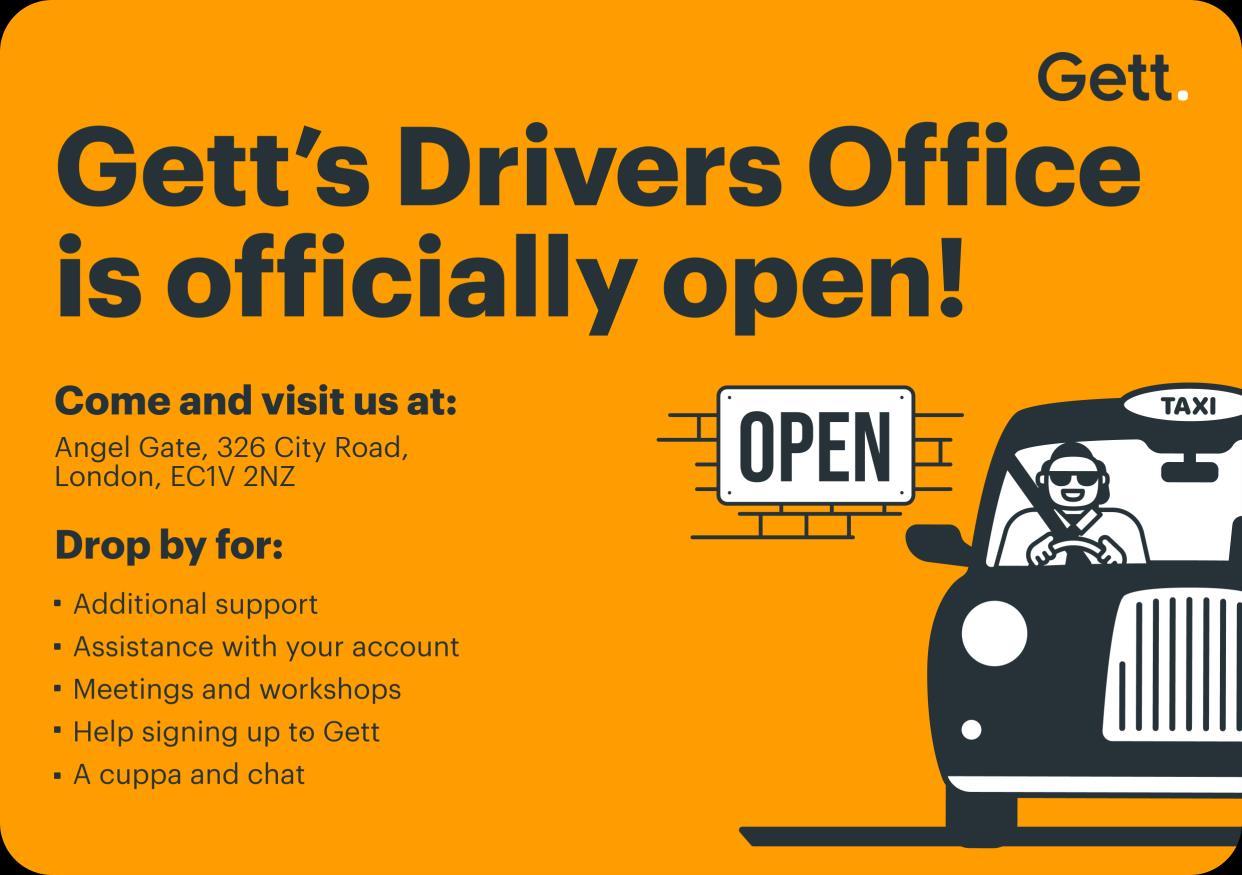
8 | TAXIPOINT | MAY 2024 | EDITION 61 WWW.TAXI-POINT.CO.UK
Amongst many questions, here are five important AV considerations:
Job Displacement: Potential reduction in the need for human-driven taxis.
Regulatory Changes: Need for updated regulations affecting taxi services.
Skill Adaptation: Taxi drivers may need to adapt to new technology-related skills.
Economic Impact: Effects on the economy of the taxi industry and related employment.
Public Perception: How the public's acceptance of automated taxis could affect demand for traditional taxi services.


9 | TAXIPOINT | MAY 2024 | EDITION 61


THE BATTLE BETWEEN STREET AND APP FARES: DOES THERE NEED TO BE A WINNER?
IMAGE CREDIT: DALL.E (AI GENERATED)
Street work requires no commission fees to a third party. The driver can keep 100% of the fare, if paid in cash, or pay a minimal amount for card processing fees usually sitting around 2%. For work taken via apps, as much as 20% could be paid to app booking platforms. Whilst this is dramatically less than private hire commissions, during busy periods in key areas of demand, taxi drivers find it difficult to prioritise app over street hails.
There’s also no lost time running in or expense in fuel when it comes to dead mileage. There’s nothing more immediate than a taxi in front of you with its light on available!
That said, apps play their part in the taxi ecosystem. Street hails very rarely happen one after the other 24/7 and in suburban locations outside of the main thoroughfares it is a great way of finding the limited demand in that area.
reduced commission for completing a certain number of fares via their app to entice drivers to service black cab customers looking on the apps.
Yes, passengers pay a premium often above the metered price and not everyone in the industry agrees with that. However, crucially enough passengers will pay the premium in order to secure a black cab over others also searching when demand is high. Are these customers our premium customers or does this model simply just allow the more wealthy to take priority over passengers that are regular passengers when charged at the regulated metered price? The answer probably sits somewhere in the middle and isn’t black or white, and it remains a question that makes some cabbies feel uneasy.
Some in the industry would argue that all street work should take precedent, but surely any customer willing to use a taxi is just as important as the next?
Prolonged dead time with no passengers onboard is no good for any taxi driver and a percentage of something, is better than a percentage of nothing.
The key is striking the right balance. The taxi industry cannot ignore the streets and ranks, but equally it cannot ignore business accounts and app users preferring to use technology to hail their service.
How do apps compete against street hail demand?
Bonuses that cover the run in times and commission fees are offered on some platforms. Some app platforms also offer larger bonuses or


What can’t be denied is that the premium offers do work when it comes to enticing drivers to servicing all passengers when there is strong demand. Some in the industry would argue that all street work should take precedent, but surely any customer willing to use a taxi is just as important as the next?
Taxi services, and the marketing of them, have to be diverse to meet the variety of buyer preferences; just as any industry needs to diversify to meet demand. Some people like booking a taxi from their phone and that’s their preference. Some drivers have no interest in taking jobs via an app and that’s their preference. Making sure there’s enough drivers to service every passenger preference, while keeping a level of fairness on both sides is the holy grail. Can it be done?
12 | TAXIPOINT | MAY 2024 | EDITION 61 WWW.TAXI-POINT.CO.UK


In some regions of the UK, taxi drivers are fighting for unrestricted access to all city roads, arguing that such access is crucial to their ability to provide essential public services effectively, especially for disabled passengers, during nighttime, and in ensuring women's safety.
Enhanced Mobility for Disabled Passengers
For disabled passengers, taxis often represent a critical mode of transport, offering more personalised and direct travel than buses or trains can provide. Road restrictions can limit a taxi’s ability to pick up or drop off disabled passengers close to their destinations, increasing the cost of fares due to forced longer routes and complicating what should be a seamless journey. Full road access would allow taxi services to offer more efficient door-to-door transport, significantly easing mobility for those with physical challenges.
Expectations of Public Transport
As a key component of public transport, taxis complement buses and trains by providing flexibility and coverage where scheduled services might not reach. Restricted road access limits this role, forcing taxis on longer routes that not only incur higher costs but also result in longer wait times for passengers. Unhindered access to roads
ensures taxis can uphold public transport expectations by filling gaps in transport networks and providing quick and efficient services across the entire city. Taxis are compelled to take the public and should be offered similar access to other public transport services.
Safety for Women
Women often prefer taxis for a safe, door-to-door service, especially late at night. Limitations on road access can force taxis to drop passengers at less safe, peripheral locations, potentially increasing risks to personal safety. Ensuring taxis can travel on all roads at all hours significantly supports women’s safety, allowing them to travel directly to their destinations without the vulnerabilities associated with walking from more distant drop-off points.
Nighttime Safety
Nighttime safety is a critical issue for all passengers, particularly in areas with limited public transport options during late hours. Taxis are that reliable 24/7 alternative, offering safe passage home when other forms of transport are scarce. Road restrictions that limit taxi operations at night can leave passengers stranded or forced to choose less safe methods of getting home.
Granting full road access to taxis is not merely about convenience but is a fundamental aspect of ensuring that taxis can fulfil their role as a versatile, safe, and responsive mode of urban transport.
14 | TAXIPOINT | MAY 2024 | EDITION 61 WWW.TAXI-POINT.CO.UK


‘Granting full road access to taxis is not merely about convenience but is a fundamental aspect of ensuring that taxis can fulfil their role as a versatile, safe, and responsive mode of urban transport.
15 | TAXIPOINT | MAY 2024 | EDITION 61 WWW.TAXI-POINT.CO.UK
‘


BANK JUNCTION: KEY MONTH AHEAD FOR BLACK CABS ACCESS CAMPAIGN
The month of May has been heralded as a decisive month for black cabs bidding to regain access through Bank Junction.
Since 2017, regulations have restricted this prime financial district crossing to only buses and cyclists from 7am to 7pm on weekdays, barring black cabs and significantly affecting their operation.
Upcoming discussions by the City of London’s governing committees are expected to cast a
spotlight on this contentious issue. The City of London Streets & Walkways Sub Committee is set to review the case on 14 May, followed by the Planning & Transport Committee on 16 May. The outcomes of these discussions are poised to influence a pivotal decision by the Court of Common Council scheduled for 20 June.
The debate over access rights at Bank Junction was recently propelled into the wider conversation when Lord Holmes of Richmond MBE addressed the
16 | TAXIPOINT | MAY 2024 | EDITION 61 WWW.TAXI-POINT.CO.UK
IMAGE CREDIT: FREENOW IMAGE CREDIT: DALL.E (AI GENERATED)


House of Lords during a debate on ‘Failing Transport Schemes’. Lord Holmes criticised the exclusion of black cabs from Bank Junction as "ludicrous". He called for a review of similar restrictions at Bishopsgate and Tottenham Court Road, challenging local authorities to justify these measures in terms of accessibility and equality compliance.
This push for policy revision is now being supported by a surge of advocacy from within the City of London's administrative bodies. Recent data disclosed by FREENOW, a European mobility service, highlighted the operational challenges at Bank Junction. Comparatively, the data highlighted a 20% reduction in taxi pickups at Bank Junction during peak hours versus those at Shaftesbury Avenue in the West End, along with higher rates of service cancellations and increased costs for passengers.
with mobility issues and in providing reliable transportation where other public transport options are limited or overcrowded.
As the key discussions approach, there is growing optimism among stakeholders, including drivers, local businesses, and commuters, that black cabs could once again service one of London’s busiest junctions. The debate touches on broader themes of urban mobility, equality, and public access, highlighting the intricate balance cities must strike between safety, efficiency, and inclusivity in their public transport networks.

Lord Holmes of Richmond MBE
The Cabs Across Bank (CAB) campaign, led by James Thomson, Deputy Common Councilman for the Ward of Walbrook and Chair of the City of London Police Authority Board, has emerged as a prominent voice advocating for change. It argues that removing the restrictions would not only enhance accessibility and safety but also bolster support for vital sectors of London’s economy. The campaign underscores the crucial role that taxis play in London's broader transport ecosystem, particularly in serving those
“Moving to taxis, an incredibly important part of our public transport network, we currently have the ludicrous situation in the City of London where Bank Junction is closed to Black Cabs, erroneously on safety grounds even though a black cab has never been involved in an accident at Bank Junction.
“Similar issues with cabs up Bishopsgate and indeed barred from Tottenham Court Road. Would the minister consider writing to the City Corporation in relation to Bank Junction and Bishopsgate? Writing to the leader of Camden and indeed the Mayor of London in relation to Tottenham Court Road to establish how these effective bans on our excellent black taxi fleet, how they deliver for accessibility, how they deliver for inclusion, and how those various authorities believe they are complying with their equality duties not least the public sector equality duty.”
17 | TAXIPOINT | MAY 2024 | EDITION 61 WWW.TAXI-POINT.CO.UK IMAGE CREDIT: MEMBERS PARLIAMENT UK ATTRIBUTION 3.0 UNPORTED (CC BY 3.0)
said at the House of Lords
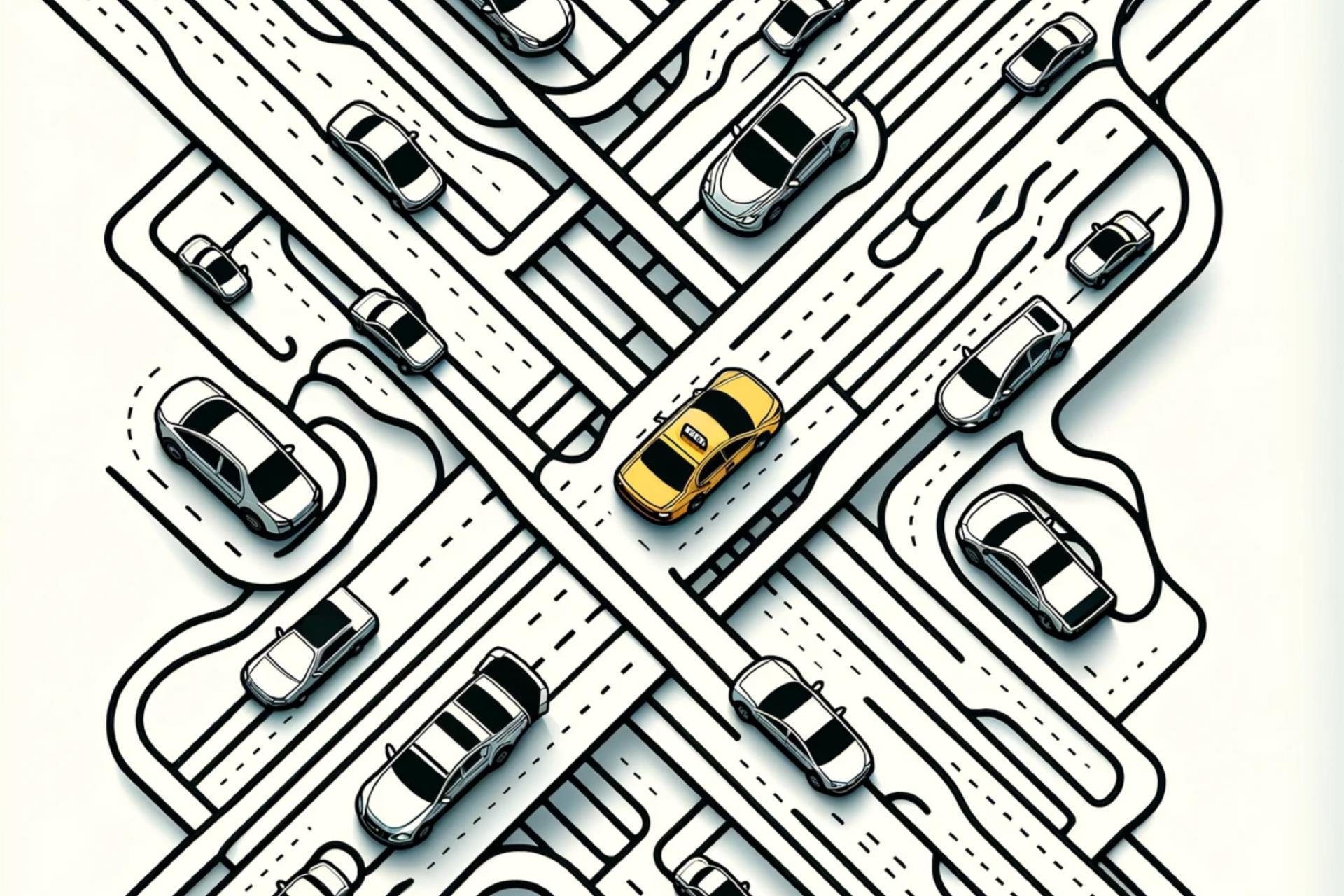
PHV VAT CONSULTATION
The Government's recent launch of a comprehensive consultation document by HM Treasury and the Department for Transport has ignited big discussions and initial apprehensions within the taxi industry regarding new VAT implications for private hire vehicles (PHVs).
Catalysed by significant High Court rulings, these decisions have forced a re-evaluation of VAT obligations across the sector, potentially transforming both financial and operational frameworks for PHV businesses.
Historically, PHV operators managed VAT as agents, but court decisions in 2021 and 2023 have
necessitated a shift to treating them as principals. The consultation seeks to explore whether PHV operators can maintain their agent status for VAT purposes while operating as principals in service delivery, potentially easing VAT burdens and averting future fare increases for consumers.
A major concern among hackney carriage drivers is the possibility of a 'zero-rated' VAT status exclusively for PHVs. Such a move would encourage PHV drivers, currently not registered for VAT, to voluntarily do so, potentially reclaiming VAT on significant expenses like vehicle purchases and fuel. This could lead to reduced operational costs and lower fares for passengers, potentially skewing competitive markets by enabling PHV operators to
IMAGE CREDIT: DALL.E (AI GENERATED)

undercut traditional taxi fares due to reduced VAT obligations.
Steve McNamara has voiced strong intentions to engage with the consultation, emphasising the necessity to uphold the current regulatory distinctions between taxis and PHVs. McNamara stated: "We are adamant about preserving the two -tier system that not only ensures passenger choice but is also critical for public safety. It is essential that any changes in VAT treatment for PHVs do not undermine licensed taxi drivers."
Mariusz Zabrocki, General Manager of FREENOW UK, also underscored the need to sustain investment and competition in the transport sector amidst these changes, voicing opposition to any VAT exemptions for PHVs to ensure fairness. Zabrocki commented: "FREENOW has paid its fair share of taxes since its 2011 UK launch and believes all PHV operators should pay VAT. We are against the proposed 0% rate for PHVs, advocating for decisions that maintain a level playing field across the entire industry."
Early indications suggest that leading PHV operators might favour a nominal 5% VAT rate over complete elimination. This marginal rate would allow operators to account for VAT solely on the
profit margin—the difference between the total fare charged to the passenger and what is paid to the driver thus reducing the VAT payable.
However, consultation research indicates that adjusting to a 5% VAT rate could decrease government revenue by roughly £1 billion annually, with a zero-rating scenario potentially cutting it by an even more staggering £1.5 billion each year. The question remains whether the Government can afford such substantial revenue losses.
As the consultation progresses, the input from various stakeholders in the taxi industry will be crucial in shaping the final legislative changes. The outcome remains uncertain as the industry awaits the consultation's conclusion.
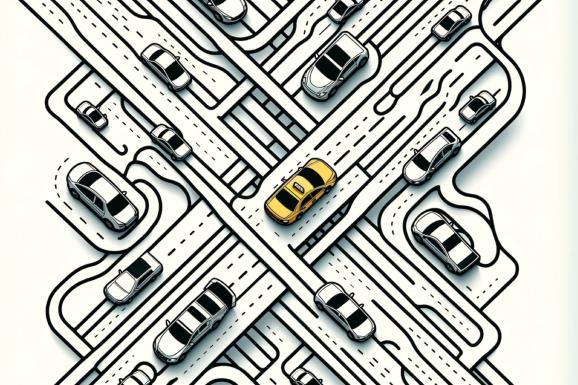

HOW WOULD A MARGIN VAT SCHEME WORK IN THE PHV INDUSTRY?
The margin scheme offered as one possible solution in the Government's recently released consultation document is a significant fiscal measure intended to adjust how VAT is applied within the Private Hire Vehicle (PHV) sector. This scheme seeks to mitigate the financial impact of recent legal changes on PHV Operators (PHVOs) and, indirectly, on passengers. Here’s a look at how the margin scheme would work and its potential implications:
Under a typical VAT system, businesses charge VAT on their total sales and claim back VAT on their purchases. The difference is paid to the Government. For PHVOs, this has traditionally
meant charging VAT on the full fare that passengers pay.
The margin scheme, however, modifies this approach by allowing PHVOs to only account for VAT on the profit margin the difference between the fare charged to the passenger and the amount paid to the driver. Here's a breakdown:
• Passenger Fare: Total amount charged to the passenger for the ride.
• Driver’s Fee: Amount that the PHVO pays to the driver.
• Margin: The difference between the passenger fare and the driver’s fee.

20 | TAXIPOINT | MAY 2024 | EDITION 61 WWW.TAXI-POINT.CO.UK
IMAGE CREDIT: DALL.E (AI GENERATED)

Under this scheme, VAT would be calculated not on the full passenger fare but on this margin. This is typically smaller than the fare itself, leading to a lower VAT liability.
Benefits of the Margin Scheme
Reduced VAT Burden: By calculating VAT only on the margin, PHVOs can significantly reduce the amount of VAT they need to pay. This is particularly beneficial for services where the margin is a small portion of the overall fare.
Price Stability for Consumers: Lower VAT costs for PHVOs could help stabilise or reduce fares for passengers, making PHV services more affordable and competitive, especially against traditional taxi services not using such schemes.
Simplified Accounting: This scheme simplifies the accounting process for PHVOs, as they would not
need to track VAT on the full fare but rather on the smaller margin.
Potential Challenges and Considerations:
Compliance and Oversight: Implementing a margin scheme requires robust systems to monitor and ensure compliance, as it could be susceptible to abuse if margins are underreported.
Impact on Revenue: While this scheme benefits PHVOs and potentially passengers, it may result in lower VAT revenues for the Government, which could affect public finances.
Fair Competition: There needs to be careful consideration to ensure that this scheme does not unfairly disadvantage other transport sectors not eligible for similar VAT treatments.

21 | TAXIPOINT | MAY 2024 | EDITION 61 WWW.TAXI-POINT.CO.UK


GETT TARGETS COMPLETE ZERO EMISSION CAPABILITY FOR BLACK CAB AND PHV RIDES BY 2027
Gett, a prominent platform for black cab and corporate ground travel, has announced an ambitious plan to make all its London-based black cab and private hire vehicle (PHV) rides zero emission capable by 2027. This initiative places Gett ahead of the London Mayor's broader goal of achieving a net zero carbon city by 2030.
As of now, nearly 60% of all travel arranged via Gett's app involves electric or hybrid vehicles, a significant increase from just two years ago. Black cabs, in particular, have seen a notable shift towards more sustainable options.
In an effort to further encourage eco-friendly changes, Gett is offering a variety of incentives to its drivers. These benefits include discounts on charging, lower prices for home charging kits, and reductions in costs associated with electric vehicle (EV) rentals, warranties, and services.
VEEZU FUELS WOLVERHAMPTON WANDERERS
FOUNDATION WITH £1,000 DONATION

Private hire operator Veezu has contributed £1,000 to the Wolverhampton Wanderers Foundation.
The donation was made through the company’s Funded by Veezu programme.
This programme serves as a funding conduit for local groups, charities, and sports teams, aiming to enhance community life in areas where Veezu operates. Its grants are geared towards fostering local development and improving quality of life.
Currently, every Gett journey in the UK is carbon neutral, achieved through a comprehensive offset program in collaboration with EcoAct. In 2023 alone, Gett contributed to the offset of 466 tonnes of carbon dioxide by supporting projects like the Maranhão Wind Power project in Brazil and the Sujawal Mangroves in Pakistan.
Matteo De Renzi, Gett CEO, said: “Urban transport plays a pivotal part in the energy transition. UK cities are among the global leaders in EV adoption and we are proud to launch this formal commitment to facilitating emission-free travel for hundreds of thousands of our riders.”
22 | TAXIPOINT | MAY 2024 | EDITION 61 WWW.TAXI-POINT.CO.UK
BUSINESS NEWS
IMAGE CREDIT: VEEZU
IMAGE CREDIT: GETT

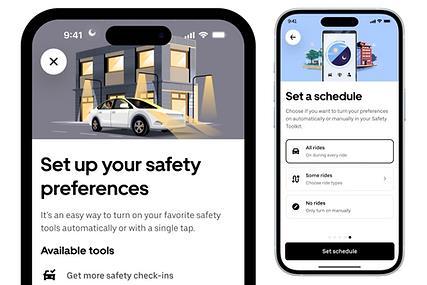
UBER UNVEILS NEW SAFETY FEATURES TO ENHANCE NIGHTTIME TRAVEL FOR WOMEN
Uber has introduced a set of new safety preferences specifically designed to protect women travelling at night.
Emilie Boman, Uber’s Director of Safety Public Policy, highlighted the pressing need for these features by revealing that over half of women feel unsafe walking alone at night close to their homes.
Uber's latest initiative offers riders the ability to customise their safety measures through the app, focusing particularly on journeys taken after dark. Boman stated that these measures are intended to provide peace of mind and simplify the use of inapp safety functions.
Available now in the U.S., Canada, and Latin America, the feature is set to expand into more countries in the coming weeks.
The new safety hub within the Uber app allows users to activate up to four specific safety features which can be set to engage automatically based on the time of day or the rider's location. These settings aim to adapt to situations such as latenight travel or when leaving venues like bars and restaurants.
LEVC UNVEILS NEW HIGH-END L380 ELECTRIC MULTIPURPOSE VEHICLE SET FOR UK MARKET WITHIN THE NEXT TWO YEARS

LEVC, traditionally known for their premium black taxis, has introduced the L380, a new MultiPurpose Vehicle (MPV) featuring a luxury interior inspired by first-class air travel.
The announcement marks a pivotal shift for LEVC, as it expands into a broader e-mobility market with its first fully electric model.
During a design showcase in Yishang Town, Hangzhou, the company disclosed its innovative use of the Space Oriented Architecture (SOA) pure EV platform. This technology is billed as crucial for the L380, offering expansive interiors tailored for both family and corporate use.
Brett Boydell, LEVC Global Chief Design Officer, said: “Our exceptionally talented team is committed to developing innovations in automotive design across the themes of luxury and space optimisation. The L380 MPV, the first of a new wave of pure electric LEVC products based on our SOA platform, truly breaks new ground, inspired by sectors such as luxury air travel and our international cultures, brought together by space-efficient and highly flexible cutting-edge technology, creating a high-level and luxurious atmosphere.”
23 | TAXIPOINT | MAY 2024 | EDITION 61 WWW.TAXI-POINT.CO.UK
IMAGE CREDIT: UBER
IMAGE CREDIT: LEVC

FARE DODGERS:
TAXI DRIVERS SHARE THEIR MOST COSTLY BILKING EXPERIENCES
Taxi bilking, a professional hazard for cabbies, involves passengers evading payment after a ride. Licensed taxi drivers got in touch with TaxiPoint and disclosed the highest amounts they've lost to fare dodgers.
Among the tales of financial loss, Alexa Hicks reported the highest single instance of bilking, losing £164 due to inexperience saying they were ‘naive and too trusting’.
Bradley Lake recounted losing a £150 fare from Kingston to Farnham, explaining his passenger was an escapee from a secure unit. Despite the loss, Lake expressed a philosophical outlook, acknowledging the passenger's desperate situation.
Lake said: “It’s a long story, so I will cut it short, she turned out to be an escapee from a supposedly
secure unit, trying to make her way home to her kids, as the police later told me.
“I took it on the chin and thought that her troubles were much greater than mine.”
Other drivers shared similar experiences with lesser amounts. One driver successfully pursued legal action after being bilked for £55. Kieran Moles, another driver, was defrauded of £70 at an airport by a woman who fled into the terminal. The woman, a thief, was later reported by the family she stole from, who compensated Moles for the fare and apologised.
Additional reports included losses ranging from £43.50 for a journey from Shrewsbury to Wrexham to several around the £50 mark, highlighting the recurring challenge of fare evasion faced by taxi drivers.
24
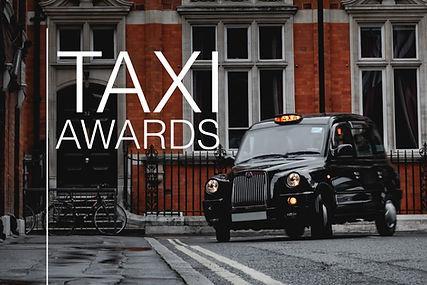
PRIVATE HIRE AWARDS GEAR UP FOR 2024 NOMINATIONS
The Parliamentary Taxi & Private Hire Awards, now in its illustrious fifth year and proudly supported by taxi app FREENOW, are set to unfold once again. This prestigious event is now accepting nominations, with the deadline set for 23 May 2024.
This initiative provides Members of Parliament an exclusive opportunity to honour drivers from their constituencies who have demonstrated exceptional dedication and service beyond their usual duties.
Drivers who believe their contributions warrant recognition are encouraged to reach out to their MPs for nomination. Historically, these awards have lauded drivers across the nation for their remarkable efforts in volunteering, charity work, and promoting sustainability, as well as for their essential role in supporting their local communities.
The upcoming ceremony, scheduled for 2 July 2024, promises to be a grand affair with a record number of Parliamentarians and nominees expected to

attend. It will be hosted at the stately Terrace Pavilion of the Houses of Parliament, with a stunning backdrop of the River Thames. This year, the event is set to be co-hosted by the distinguished British broadcaster, author, and political commentator Iain Dale, alongside the event's founder, Daniel Zeichner MP.
Daniel Zeichner MP said: "The Parliamentary Taxi & Private Hire Awards is a chance for MPs to celebrate and honour taxi and PHV drivers and shine a light on all the fantastic work they do in their communities.
I'm looking forward to welcoming drivers to this year's Awards, which will be taking place on 2 July in the Houses of Parliament.
“After the huge success of last year's event - which saw a record number of outstanding nominations - I cannot wait to read this year's submissions. I'm also delighted that once again, the Awards sponsor is mobility app FREENOW - leading licensed taxi company in Europe and London’s No. 1 Taxi app."
25
TIME TO REDUCE TAXI AIRPORT FEES?


UK'S VARIED DROP-OFF AND PICKUP FEES AND HOW IT IMPACTS PASSENGERS
Airports across the UK have implemented a broad spectrum of fees for drop-offs and pick-ups, sparking a significant conversation about the impact on passengers and the taxi industry.
Our analysis of current rates reveals a complex picture, with some airports charging substantially more than others, which could influence both consumer behaviour and the dynamics of taxi services.
Steep
Fees at Major Hubs: Heathrow and Stansted Lead the Way
Among the major players, Heathrow Airport sets a high bar with a £5 drop-off fee escalating to £7.50
for pick-ups. Stansted outpaces all with the highest drop-off charge at £7 and an even steeper £10 pickup fee. Birmingham Airport also charges an eye watering £7.50 for pick-ups, but interestingly gives back with free drop-offs.
More Affordable Options: The Case of Newcastle
On the more affordable end of the spectrum, Newcastle Airport charges a respectable £4 for both drop-offs and pick-ups. Offering more balanced fees could potentially attract more passengers who are sensitive to the additional costs associated with air travel, and consequently, could see a boost in taxi usage due to the reduced overall travel expense.
26 | TAXIPOINT | MAY 2024 | EDITION 61 WWW.TAXI-POINT.CO.UK

In many countries around the world taxis are used to drive down private car ownership and forms part of their public transport network.
Free Access and Time-Limited Waivers: London City and Birmingham Stand Out
London City Airport offers a unique proposition with no drop-off fees, though a £4.50 charge applies for pick-ups. Birmingham Airport provides a 10-minute free drop-off window, which, although brief, offers a reprieve for quick stops.
Passenger and Driver Impact: A Delicate Balance
The varied fee structure inevitably affects passengers who generally absorb these costs, rather than the drivers. This could deter some customers from using airport taxis, especially when alternative transport options like trains or buses offer a more economical fare. However, the very nature of an airport trip, usually with heavy luggage and time constraints, means taxis are still the preferred mode of transport for many.
Hackney Carriage Considerations: Should There
Be an Exception?
The debate extends to the treatment of hackney carriages, which are required by law to pick up passengers when hailed. The question of whether these vehicles should be charged the same fees as private hire vehicles is significant. Given their role in public service, there has been a case for exempting hackney carriages from these fees, or at least reducing them, to support their availability and affordability as a public transport option.
Looking Ahead: Strategic Implications for UK Airports
As UK airports continue to navigate the balance between generating revenue and facilitating accessible transportation, the variations in drop-off and pick-up charges present a strategic dilemma. Airports will need to consider how these fees fit into broader transport policies and impact passenger decisions, potentially affecting their competitive position in the UK's air travel market.
The current landscape of airport fees not only affects passenger wallets but also has broader implications for the taxi industry and public transport services.

27 | TAXIPOINT | MAY 2024 | EDITION 61 WWW.TAXI-POINT.CO.UK

LONDON NEWS THE CLAIM IS IN: LONDON TAXI DRIVERS LAUNCH £250M LEGAL BATTLE AGAINST UBER
Over 10,500 licensed black cab drivers, represented by RGL Management, are taking legal action against ride-hailing giant Uber. Filed in the High Court under the title "BULiT21", this lawsuit alleges significant losses due to what they claim were Uber's unlawful operations in London from May 2012 until March 2018.
The basis of the claim is, unlawful means conspiracy arising out of actions taken by Uber to obtain, improperly, a Private Hire Vehicle Licence, as granted to them by Transport for London (TfL), pursuant to the terms of the Private Hire Vehicles (London) Act 1988. The Claimants will allege that Uber's operating system did not comply with the requirements of the Act; that Uber knew this at all material times; and that in order to obtain its licence Uber deliberately misled TfL as to how that operating system worked.
The Claimants will further allege that Uber's intention was to gain market share unlawfully and, by necessity, take business from existing black cab drivers.
The legal filing in the Commercial Court represents 10,887 cabbies, with expectations that more will join the fray, potentially pushing the claim's value beyond £250 million, interest included.
Eligibility for joining the group action extends to any licensed green or yellow badge driver active in London between June 2012 and December 2018. For those who drove full-time during this period, the potential compensation could exceed £25,000.
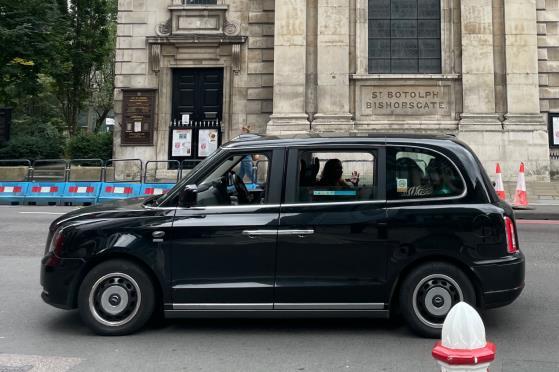
RGL Management has noted a daily increase in registrations and is urging drivers to sign up before the imminent deadline. The claim is risk-free for participants, with costs covered by ATE insurance, ensuring that drivers will not face financial burdens should the claim fail.
Michael Green, Director, RGL Management, said:
“RGL is pleased to file this claim form today on behalf of over 10,500 London cabbies, a major legal milestone in holding Uber to account for its failure to comply with the relevant legislation in the UK’s capital.
“The claims are fully funded and insured and all concerned are confident of achieving a successful conclusion through the courts.
“There are still thousands of cabbies eligible to join who have not yet done so. A cut-off date is fast approaching. RGL therefore urges drivers to register with the BULiT21 legal action as soon as possible to join with thousands of fellow cabbies in the pursuit of losses suffered at the hands of Uber.”
28 | TAXIPOINT | MAY 2024 | EDITION 61 WWW.TAXI-POINT.CO.UK

LOWER THE VAT: BLACK TAXI DRIVERS DEMAND GOVERNMENT ACTION FOR EASIER SWITCH TO
LELECTRIC
ondon’s black cab drivers are urging for better governmental support to speed up their transition to electric vehicles (EVs). This includes a proposal to cut VAT on public EV chargers to 5% the same rate
as domestic chargers and to increase access to rapid charging stations.
Currently, approximately 60% of London's nearly 15,000 black cabs are electric or zero-emission capable. However, drivers and representatives at the Licensed Taxi Drivers’ Association (LTDA) believe that reduced VAT and better infrastructure could significantly speed up the shift to a fully electric fleet.
In a bid to demonstrate potential improvements, LTDA has partnered with InstaVolt, one of the UK's top rapid charging network. InstaVolt has recently inaugurated its largest ultra-rapid EV charging hub in Syon Park, Brentford. While the hub is intended for all EV users, it particularly benefits taxi drivers due to its strategic location near major transport links like the M4 and Heathrow Airport.
InstaVolt is also showing its support by temporarily reducing the cost of charging by 15% at its stations across London. This gesture aims to align with the black cab drivers’ campaign for VAT reduction on public chargers.

IMAGE CREDIT: INSTAVOLT

The push for electric taxis aligns with Transport for London’s (TfL) broader environmental goals, which include making London net zero-carbon by 2030. Since 2018, new taxis in the city are required to be zero emission capable, but many argue that more aggressive measures are needed to meet these targets.
Simon Smith, InstaVolt’s Chief Commercial Officer, said: “Black cabs are part of the capital’s fabric and we’re thrilled to be supporting them with our expanding network across London and fantastic new super hub at iconic Syon Park.
“Cabbies are busy people for whom quite literally time is money and they need ready access to reliable charging solutions so they can get back on the road as quickly as possible, making InstaVolt the perfect partner. At Syon Park and across our network, cabbies can benefit from our industry leading 99%+ reliability as well as accessing a whole host of amenities. While their cabs are charging, they can meet up with their fellow drivers, enjoy a cuppa and be back on the road in minutes.
“Well over half of London’s black cabs are now electric but the shortage of rapid public charging points and rising cost of charging remain barriers to wider uptake of electric taxis. Reducing the VAT on public charging, bringing it into line with home chargers, would help level the playing field for those drivers unable to charge at home as well as supporting drivers with mounting operating costs. We hugely appreciate InstaVolt’s gesture of removing the VAT equivalent themselves to demonstrate the positive impact such a reduction would have.”

“We are also delighted to be supporting the black cab drivers in their fight for lower prices for onstreet public charging by self-removing 15% of our charging cost, effectively leaving a 5% element inline with the VAT for home charging.”
Steve McNamara, General Secretary of the LTDA, said: “Rapid charging superhubs like this fantastic facility are key to expanding the charging network in London and ensuring drivers can always find a place to charge their cab and benefit from amenities while they wait.
Quintin Willson, transport campaigner and original Top Gear presenter, said: “FairCharge has campaigned for three years repeatedly asking the Treasury to cut the VAT on public EV charging, and help reduce costs for those electric car drivers who can’t charge at home. Affordability is one of the key levers to mass EV adoption. I’m really encouraged to see InstaVolt symbolically reduce their prices, to reflect the difference a VAT cut would make, and for the LTDA and all their EV cab drivers to join the campaign. Hopefully this will help HMT appreciate that reducing the tax on electricity for public EV charging is an important lever for increasing EV adoption."
30 | TAXIPOINT | MAY 2024 | EDITION 61 WWW.TAXI-POINT.CO.UK IMAGE CREDIT: INSTAVOLT
REGIONAL NEWS
NEWCASTLE-UNDER-LYME TAXI FARES SET TO SURGE BY 25% DUE TO RISING OPERATIONAL COSTS

Newcastle-under-Lyme taxi fares are poised for a sharp increase, with some journeys potentially costing almost a quarter more than current rates.
This hike is primarily attributed to escalating operating expenses faced by drivers.
During a daytime trip, the cost for a two-mile journey in a Hackney carriage will jump by 24.3%, escalating from £5.55 to £6.90. Similarly, the rate for the same distance at night will see an increase of 18.2%, rising from £7.40 to £8.75.
This fare revision was agreed upon in a recent council
meeting held on 29 April. However, the changes will first undergo a consultation phase before they are formally approved by the council’s cabinet.
Additionally, there will be an adjustment in the timing of the evening tariff, which will now begin at 11pm instead of midnight. Despite some proposals for an earlier start at 10pm to align with nearby Stoke-on-Trent, this suggestion was not adopted. Moreover, the soiling charge, imposed for excessive uncleanliness, is set to increase from £60 to £80.
SWINDON COUNCIL HALTS PUSH FOR MANDATORY CCTV IN TAXIS DUE TO RECORD-KEEPING CHALLENGES

Swindon Borough Council has backtracked on its decision to require CCTV installation in all local taxis, citing overwhelming administrative demands and resource constraints.
Initially, in mid-2022, the council's licensing committee agreed to enforce CCTV in all new and existing taxis by April 2023. However, staffing shortages within the licensing department thwarted these plans, pushing the implementation deadline back by one year.
Further scrutiny into the policy unveiled substantial data management challenges, as outlined by the Information Commissioner's Office (ICO). The council, as the data controller, would face rigorous technical and legal obligations to manage the footage securely, an undertaking now deemed too burdensome.

31 | TAXIPOINT | MAY 2024 | EDITION 61 WWW.TAXI-POINT.CO.UK

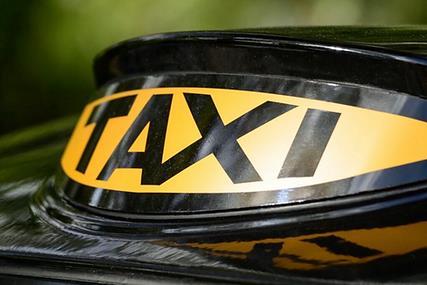
January 2024, is aimed at simplifying the regulatory landscape post the April 2021 unitary authority reforms. The proposal, endorsed by the Licensing and Appeals Committee, seeks to modernise hackney carriage operations which have traditionally been segmented by local authority boundaries.
The proposed changes involve not just the consolidation of geographical zones but a thorough overhaul of hackney carriage byelaws. The scrutiny committee has advanced the report for a final decision at the executive meeting scheduled for early June, urging simultaneous preparations for a revised licensing test if the single zone scheme is approved.
Meetings with local taxi operators have highlighted a mixture of support and significant concern. Some see the unification as a potential reduction in administrative burdens and operational costs. Others, particularly from Corby and Wellingborough, worry about the economic viability
The new knowledge test proposal has sparked intense debate. It would require drivers to familiarise themselves with the entire county, including key locations like train stations and town centres, and also utilise satnavs for navigation. Critics argue that this dilutes the traditional skills expected of a hackney carriage driver, known for their detailed local knowledge. “We do need to make sure that we set the test at the right level which effectively reflects what’s required in a modern test, the increased size of North Northants as an area and the key locations that people would need to know,” explained Iain Smith, assistant director of regulatory services at NNC.
Despite these challenges, NNC maintains that dezoning would enable taxi businesses to operate across North Northamptonshire without needing multiple licenses, potentially broadening their market reach. This flexibility, however, requires all drivers to pass the same comprehensive countywide knowledge test, regardless of their operational preferences.
32 | TAXIPOINT | MAY 2024 | EDITION 61 WWW.TAXI-POINT.CO.UK

NORTHERN IRELAND’S ANNUAL SPEND ON SEN PUPIL TAXI TRANSPORT NEARS £34 MILLION CONFIRMS MINISTER

In a recent session of the Northern Ireland Assembly, the costs associated with transporting pupils with special educational needs (SEN) were brought to the forefront during a debate on the 'Home to School Transport Policy'. Cheryl Brownlee of the DUP raised a critical question regarding the financial burden of SEN transport and taxi services.
Paul Givan, responding on behalf of the DUP, revealed that the Government spent just under £34 million on taxi services for SEN pupils in the fiscal year 2023-24. This significant expenditure supports the daily transport of over 90,000 school pupils, including more than 10,000 with specified additional needs as outlined in their educational statements.
SEN transport is an essential service designed to ensure that children who have disabilities or require special educational provisions can attend school regularly. This service caters specifically to those who cannot use regular transport due to their physical, cognitive, sensory, or emotional needs.
The importance of SEN transport extends beyond just attendance; it plays a crucial role in the social inclusion of SEN students, facilitating their right to education and access to suitable learning environments. For many families, the availability of dedicated SEN transport is a critical factor that eases daily routines, reducing the logistical stress of school commutes and enhancing the safety and comfort of their children.
The bespoke nature of SEN transport services, which includes the provision of specially equipped vehicles and trained personnel, ensures that each pupil's journey to and from school is tailored to their individual requirements. This personalisation helps in accommodating a wide range of SEN conditions, thereby supporting the educational development and well-being of these students.

33 | TAXIPOINT | MAY 2024 | EDITION 61 WWW.TAXI-POINT.CO.UK
EAST DUNBARTONSHIRE COUNCIL OPENS THE DOOR FOR NEW TAXI LICENCE APPLICANTS
East Dunbartonshire Council is now inviting applications for new Taxi Operator Licences, aiming to boost the local availability of taxis.
The council has set out a flexible approach for potential applicants, stating that it's not necessary to own a car or have insurance in place at the time of application. Those required arrangements can be made once the approval of the licence is secured.
Prospective taxi operators are allowed to apply for up to two licences. The council will confirm when all necessary checks have been completed. Following this, applicants must provide detailed vehicle information such as the registration number, insurance details, and proof of ownership. Only after these details are verified will the licences be officially issued along with the corresponding taxi plates.
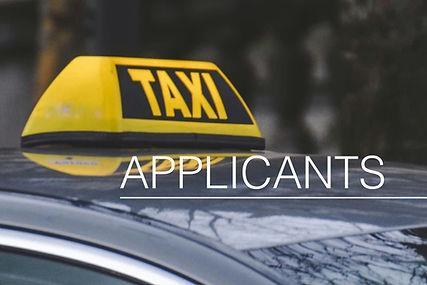
a separate Taxi Driver Licence, which must also be obtained from the council.

This initiative is part of East Dunbartonshire's efforts to enhance transport services and meet the community’s growing transportation needs.
Councillor Gordan Low, Convener of the Policy and Resources Committee and Council Leader, said: "We're keen to increase the number of taxis available locally – helping to support residents, businesses and schools who rely on their vital services.
"Work is taking place to support the trade and encourage potential new operators, including flexibility as regards vehicle ownership and insurance before a licence is granted. If you're interested, please get in touch and find out more."
UNINSURED WOLVERHAMPTON
LICENSED DRIVER FINED OVER £1,200 AFTER ILLEGALLY PLYING-FOR-HIRE IN LIVERPOOL
An uninsured Wolverhampton licensed driver caught illegally plying for-hire in Liverpool, now faces a large fine and penalty points on his licence.
According to Knutsford Guardian, the driver has been fined £1,270 by the Liverpool and Knowsley Magistrates' Court after being found guilty of illegally plying-for-hire on Church Street, Liverpool.
Madeh Ahmadi, 38, admitted to plying without the required hackney carriage licence issued by Liverpool City Council.
Ahmadi was driving a vehicle licensed by Wolverhampton City Council on the day of the incident on 9 September 2023.
In addition, Ahmadi was charged with driving without third-party insurance.
34 | TAXIPOINT | MAY 2024 | EDITION 61
WEST BERKSHIRE CHARGES HUNDREDS OF VEEZU
DRIVERS PROTEST LARGE HIKE IN COMMISSION FEES AMID COST OF LIVING SQUEEZE
Approximately 500 private hire drivers from Sheffield and Rotherham congregated outside Veezu headquarters to protest against the company’s newly introduced terms that they claim will significantly cut their earnings.
The demonstrators expressed dismay over Veezu’s decision to reduce fares while simultaneously increasing the commission it deducts from each ride.
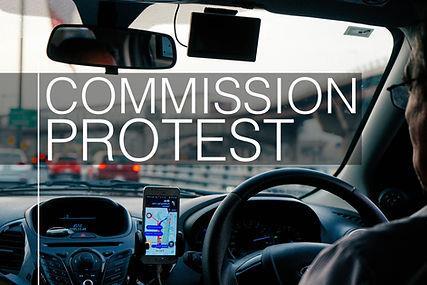
The controversy stems from Veezu’s announcement about increasing the commission rate from 20% to 35%, marking a substantial 75% hike. This change follows Veezu’s acquisition of City Taxis last year, which brought over 2,000 drivers under its wing. Drivers argue that these adjustments, made during a broader cost of living crisis, will plunge them into financial distress.
Mujahid Hussain, a driver with over a decade of experience, voiced concerns about the dire financial impact these changes would have. Hussain explained that with rising fuel prices and ongoing expenses such as insurance, the increased commission could reduce take-home pay. The driver added that to meet financial targets set by Veezu, he is compelled to work every day of the week, leaving little room for family time.
The drivers argue that while the company reduces ride costs to appeal to users, it neglects
the financial well-being of its drivers. Despite their self-employed status, one driver highlighted the necessity for Veezu to provide adequate support to its workforce, suggesting that their needs are currently being overlooked.
According to ITV News, a spokesperson for Veezu said: "As self-employed drivers running their own businesses, several of the drivers have proposed commercial terms which Veezu is considering and will be discussing with them in the coming weeks.
"As self-employed individuals in business, the drivers operate across several different licensed operators in Sheffield and can decide which operator they use.
"Veezu hopes that the drivers continue to operate via our system, but we recognise this is a commercial market and that drivers will choose to drive with different and multiple operators."

35 | TAXIPOINT | MAY 2024 | EDITION 61 WWW.TAXI-POINT.CO.UK

ENFORCEMENT NEWS
PRIVATE HIRE VEHICLE DRIVER REPORTED BY POLICE AFTER REFUSING TO WEAR A SEATBELT
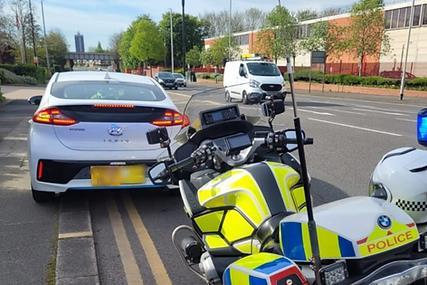
A Private Hire Vehicle (PHV) driver was reported by the police after refusing to wear a seatbelt in the Manchester area.
The incident unfolded when a GMP Motorcycle Unit officer observed the driver operating the vehicle without a seatbelt on Park Road, Stretford. Initial advice was given to the driver to rectify the situation by fastening the seatbelt. However, the driver chose to ignore this safety directive, leading to further police action.
The regulations surrounding the wearing of seatbelts for drivers in the UK are clear. While licensed taxi drivers who are actively seeking passengers or stationed at taxi ranks known in the trade as 'plying for hire' are exempt from the requirement to wear a seatbelt, this exemption does not extend to PHV drivers without passengers.
The law mandates that PHV drivers must wear seatbelts when there are no passengers in the vehicle.
Both taxi and PHV drivers are exempt from wearing a seat belt when passengers are onboard.
TAXI DRIVER ATTACKED AND ROBBED IN ‘FRIGHTENING AND DISTRESSING’ BATLEY INCIDENT

The incident unfolded in the early hours of Thursday 25 April, near Fry Dayz Fisheries on The Parade.
Police officers report that the episode occurred shortly after 3.25am when a Toyota Prius, summoned to a nearby address, arrived at the designated pickup point. An assailant then entered the vehicle, brandishing a knife at the driver before physically assaulting him.
The perpetrator subsequently escaped with a quantity of cash and various items from the vehicle. While the driver sustained no physical injuries, he was left considerably distressed by the ordeal.
The Kirklees District Crime Team urges anyone with information to come forward to aid their investigation into the distressing event.
Detective Sergeant Andy Holmes of the Kirklees District Crime Team, said: “We are continuing a number of enquiries into this serious incident which was clearly a very frightening and distressing experience for the driver.
“I would like to speak to anyone who may have information which could assist the investigation or perhaps footage from home CCTV which captures what occurred.
36 | TAXIPOINT | MAY 2024 | EDITION 61 WWW.TAXI-POINT.CO.UK
IMAGE CREDIT: GMP TRAFFIC


BARNSLEY AUTHORITIES CRACKDOWN ON NONCOMPLIANT TAXIS AND PHVs BOTH IN AND OUTSIDE THEIR LICENSING AREA
Barnsley Licensing Officers took action against non -compliant hackney carriages and private hire vehicles during a recent enforcement operation. The operation, conducted on 2 March 2024, focused on vehicles operating within the borough, especially those active in the town centre's nighttime economy. A total of eight vehicles were inspected during the night, including six licensed by Barnsley and two by external authorities, Rotherham and Wolverhampton.
The results of the inspection were telling. Four vehicles were found to be non-compliant with the licensing standards; issues ranged from improperly displayed licence plates to faulty lights. Furthermore, three drivers received written warnings for failing to complete mandatory daily check books.
Despite these infractions, all drivers approached during a simultaneous test purchase operation conducted in the town centre were compliant, indicating a mixed level of compliance among licensees.
The report said: “Vehicle and driver noncompliance is an issue Officers are concerned with during the undertaking of every enforcement operation. Regardless of which authority issued the licences, defective vehicles are not acceptable and cannot be excused and officers will continue to pro-actively enforce both the legislation and our local conditions accordingly.
“Proactive and reactive enforcement operations will continue to take place on a regular basis. Vehicle failures are always unacceptable, and our enforcement operations must convey the message that operators, vehicle proprietors and drivers must accept responsibility for any failures and make a change. All Licensing Authorities have clear standards that must be adhered to as failure to do so may put the safety of the public at risk when using a hackney carriage or private hire vehicles.
“The principal consideration for all is, as always, one of public safety.”
The Assistant Director to the General Licensing Regulatory Board, reported the need for continuous proactive and reactive enforcement operations. The report highlighted the importance of vehicle and driver compliance with established licensing standards, stressing that safety should always be the top priority.
37 | TAXIPOINT | MAY 2024 | EDITION 61

BILKER ALERT: POLICE RELEASE IMAGE AFTER MAN DOES RUNNER FROM TAXI WITHOUT PAYING
North Yorkshire Police have released a CCTV image of an individual sought in connection with a taxi bilking incident in Scarborough.
Authorities are appealing for public assistance to identify the man believed to have run off without paying for his ride from Pickering to Scarborough in the early hours of 29 February.
The incident, occurring between 4.30am and 5.00am, has triggered a series of investigations. Despite extensive efforts, the identity of the suspect remains unknown.
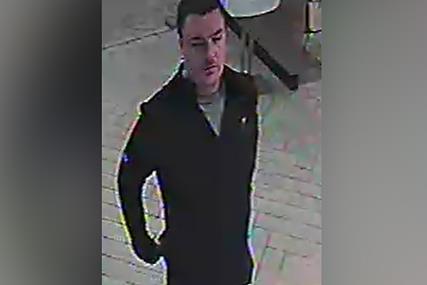
Bilking, the act of making off without payment, poses a serious financial threat to taxi drivers. This
rightful earnings but also impacts their ability to cover operational costs such as fuel and vehicle maintenance, potentially affecting their overall livelihood.
‘OUTRAGEOUS AND UNACCEPTABLE’: LIVERPOOL LICENSING OFFICERS REPORT OUT-OF-AREA PHV FOR SHOCKING TYRES
Liverpool City Council's Licensing team suspended a Bury Private Hire Vehicle (PHV) found operating within the city with severely worn front tyres.
The discovery revealed tyres so deteriorated that the internal cords were exposed, posing a significant risk to public safety.
A spokesperson from Liverpool City Council expressed strong disapproval of the condition of the vehicle, stating that it was "outrageous, dangerous and totally unacceptable". The driver is set to be reported for the offences.
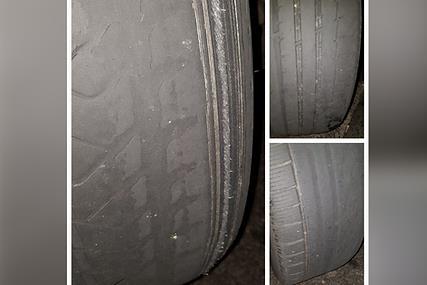
38 | TAXIPOINT | MAY 2024 | EDITION 61 WWW.TAXI-POINT.CO.UK
IMAGE CREDIT: LCC LICENSING





APPS




EMISSIONS SYSTEMS


39 | TAXIPOINT | MAY 2024 | EDITION 61 INSURANCE








40 | TAXIPOINT | MAY 2024 | EDITION 61 WWW.TAXI-POINT.CO.UK FINANCE MEMBERSHIP CARD PAYMENTS GROUP CLAIM OUTSOURCE VEHICLE SALES







 TaxiPoint Editor
TaxiPoint Editor



























































